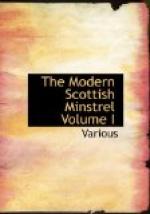Though April his temples may
wreathe with the vine,
Its tendrils in
infancy curl’d;
’Tis the ardour of August
matures us the wine,
Whose life-blood
enlivens the world.
Though thy form, that was
fashion’d as light as a fay’s,
Has assumed a
proportion more round,
And thy glance, that was bright
as a falcon’s at gaze,
Looks soberly
now on the ground—
Enough, after absence to meet
me again,
Thy steps still
with ecstacy move;
Enough, that those dear sober
glances retain
For me the kind
language of love.
* * * * *
METRICAL TRANSLATIONS
FROM
The Modern Gaelic Minstrelsy.
* * * * *
ROBERT MACKAY (ROB DONN).
Robert Mackay, called Donn, from the colour of his hair, which was brown or chestnut, was born in the Strathmore of Sutherlandshire, about the year 1714.
His calling, with the interval of a brief military service in the fencibles, was the tending of cattle, in the several gradations of herd, drover, and bo-man, or responsible cow-keeper—the last, in his pastoral county, a charge of trust and respectability. At one period he had an appointment in Lord Reay’s forest; but some deviations into the “righteous theft”—so the Highlanders of those parts, it seems, call the appropriation of an occasional deer to their own use—forfeited his noble employer’s confidence. Rob, however, does not appear to have suffered in his general character or reputation for an unconsidered trifle like this, nor otherwise to have declined in the favour of his chief, beyond the necessity of transporting himself to a situation somewhat nearer the verge of Cape Wrath than the bosom of the deer preserve.
Mackay was happily married, and brought up a large family in habits and sentiments of piety; a fact which his reverend biographer connects very touchingly with the stated solemnities of the “Saturday night,” when the lighter chants of the week were exchanged at the worthy drover’s fireside for the purer and holier melodies of another inspiration.[87] As a pendant to this creditable account of the bard’s principles, we are informed that he was a frequent guest at the presbytery dinner-table; a circumstance which some may be so malicious as to surmise amounted to nothing more than a purpose to enhance the festive recreations of the reverend body—a suspicion, we believe, in this particular instance, totally unfounded. He died in 1778; and he has succeeded to some rather peculiar honours for a person in his position, or even of his mark. He has had a reverend doctor for his editorial biographer,[88] and no less than Sir Walter Scott for his reviewer.[89]




